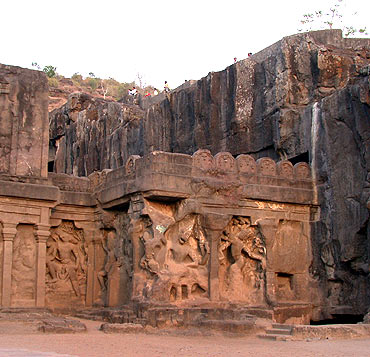
S H Raza
In our special series on the India You Didn't Know, eminent painter S H Raza remembers Indian greats Ghalib, Tagore, Faiz and Kabir -- and lauds our inheritance of different forms of Indian classical music.
We Indians have inherited a rich cultural heritage which demands that we study it, understand it and be worthy of it. But when one sees objectively what is happening today, I feel that it is quite a disaster. We are not able to treasure what a truly remarkable heritage we have inherited, at least a majority have failed to do so.
I have stayed in Europe for about 60 years and now I am very happy to have come back home this year. I still cherish fond memories of my childhood in Madhya Pradesh, where my father was a forest officer, and I held a close bond with the tribals there.
I also love travelling to the Ajanta and Ellora caves. But today, I feel a lot of people get carried away with petty and inconsequential things in life. We should go back to our roots and study the Bhagwad Gita, Ramayana, the Bible and Quran. It is not merely about wearing a cross or a kurta pyjama.
How many of us can recall the truly great Hindi and Urdu writers and poets? How many of us remember the works of Ghalib and Faiz, Tagore and Kabir? Not many, I fear.
Unfortunately today, I feel the public at large are more focussed and interested in the things that are so superficial; money is not everything. Yes, one should have it, but it is never the objective of art, religion or culture.
One should be focusing on the essential things in life, which can help a person find the meaning of existence. Are we able to appreciate the simple things in life? I think not many of us can.
I find the city dwellers mostly have lost direction of what is of importance and meaning in life. I have spoken to people from all walks of life. An ordinary road labourer can sometimes exhibit the rarest of traditional wisdom, of nourishing the simple things in life. But a majority of the city people can't.
Indian art is being well recognised and well appreciated today, and we are finally arriving on the world scene. But we are not doing enough to remember the works of Indian artists from our past.
I feel Amrita Sher-gill was one of the finest painters we have ever seen, and yet it is so difficult to find most of her works. There are a few in museums across the country, but there are still few rare works, which are just so hard to find. I think we need to see more of her work.
Consider Indian music, for instance. On one hand, we have the great inheritance of different forms of Indian classical music, and on the other, is cinematic music. I feel one should clearly know the merits of the Indian classical music and also understand what the cinematic music lacks.
Yes, there have been a few initiatives to bring our wealth of art, religion and culture to the masses, but it not enough. There are few people who are interested, but a majority is still largely indifferent to it. I feel we have to become worthy of the rich heritage we have inherited and learn and study it deeply, and appreciate it.
S H Raza is one of India's most eminent painters. His painting Saurashtra is the most expensive Indian painting to be auctioned. He is the recipient of the Padma Shri and the Padma Bhushan. He spoke to Priyanka.
Earlier in the series:
India's jewel in the Arabian Sea
Deepika Padukone on her beloved India
'It is easy to belong and be accepted in India'
'There is an India we don't wish to know'
'The world has come to know India better'
'The credit is in India's roots and its stories'
'See the Ganga aarti at least once'
'They looked African, but spoke Gujarati'
'Indians have a sense of humour'
'Hindu couple at an Islamic shrine shows what makes India work'